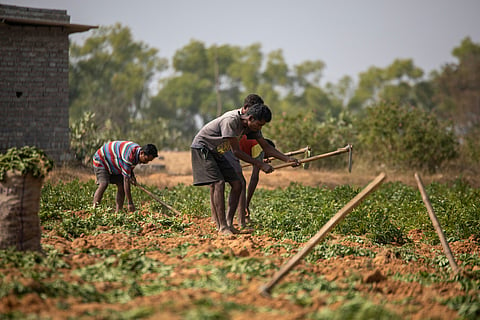

The central government has issued directives to Andhra Pradesh and Telangana, advising them to shift their focus under the Mahatma Gandhi National Rural Employment Guarantee Scheme (MGNREGS) to agriculture and allied works from renovation and desiltation projects. The advisory is likely a bid to realign expenditure and potentially curb ‘excess’ employment under the scheme in these states, according to an expert.
The Mahatma Gandhi National Rural Employment Guarantee Act of 2005 requires that every rural household with adult members who volunteer to do unskilled manual work receive at least 100 days of guaranteed wage employment, known as person-days of work, each fiscal year.
Approximately 88 per cent more person-days of work were generated in April 2024 compared to April 2023, Union Ministry of Rural Development said in an advisory to principal secretary of Telangana issued May 24, 2024. On comparison with financial years 2020-21, 2021-22 and 2022-23, the increase in person days was 47 per cent, 33 per cent and 90 per cent, respectively.
The notice also stated the number of districts generating more than 100 per cent person days in April 2024 was higher compared to April 2023, with Khammam at 379 per cent, Karimnagar at 227 per cent and Jogulamba Gadwal at 197 per cent, among others.
Person days were generated at a rate higher than the state average, the advisory said. It also revealed that, until May 15, 2024, nearly 58.5 per cent of the expenses were spent on renovation and desilting projects worth Rs 596.28 crore.
Only 123,000 individual jobs were taken in fiscal year 2024-25 until May, with a spending of Rs 182.79 crore — accounting for nearly 17.9 per cent of total expenditure. “There is a need to improve the prioritisation of work and livelihood opportunities for vulnerable families in the state of Telangana,” the notice said.
The advisory for Andhra Pradesh was sent on May 7, 2024. It stated that in the current fiscal year 2024-25 (until April 2024), 216,000 projects of renovation and desilting accounted for 69.5 per cent of total expenditure for the state — totalling Rs 676.6 crore.
The total amount spent on just 172,000 individual works was Rs 93.66 crore, or about 9.6 per cent of total expenses. “There is a need to improve the prioritisation of works and livelihood opportunities for vulnerable families in Andhra Pradesh,” the notice stated.
This suggests that a bottom-up approach — as mandated by the MGNREGA — has not been implemented, the advisories said. Instead, a top-down approach for planning works has been adopted in the state, resulting in high person-days and high expenditure.
According to the Act’s provisions, the district programme coordinator must ensure that 60 per cent of the work is allocated to the creation of productive assets directly related to agriculture and allied activities through the development of land, water and trees.
In Telangana, only 30.12 per cent of the expenditure went towards asset creation, the notice stated. In Andhra Pradesh, only 41.65 per cent of the money was spent on creating product assets related to agriculture and allied activities.
Other ’violations’ highlighted in the notices included fewer funds spent on water conservation works, more funds spent on material components than permitted and so on.
In both states, the ministry did not find a single work on gully treatment or catchment treatment listed as one of the top 30 works, which helps increase soil absorptive capacity, protect land surfaces and serve as natural drainage ways from erosion and surface runoff from fields.
However, researchers describe the advisory as an excessive interference in state autonomy. They stated that the onus of deciding works under the scheme should be placed on the states based on their needs within the broad principles outlined by the centre.
Chakradhar Buddha, researcher at LibTech India, a platform for social workers, engineers and social scientists working towards improvement of public service delivery said that AP and Telangana ranked first and second in MGNREGA employment generation for April, May and June 2024.
“As a result, the actual employment generated was more than double the planned or estimated figures,” he explained.
The situation appears contradictory, Buddha added. “On the one hand, the Union government appears unconcerned when the names of tens of millions of workers in the lists for MGNREGS are removed without informing the Gram Sabha and doesn’t even consider the resolutions for it. But when it comes to providing employment for workers, they suddenly become acutely aware of the issues plaguing the scheme,” he said.
The activist also emphasised that pond desilting is an important part of agriculture and related activities. He stated that the advisory can be viewed as a way to reduce the unprecedented level of employment in AP and Telangana. “If the trend continues, they would have to significantly increase the labor budget for the demand-driven scheme,” he added.